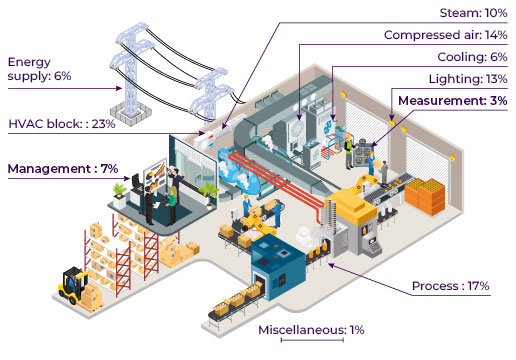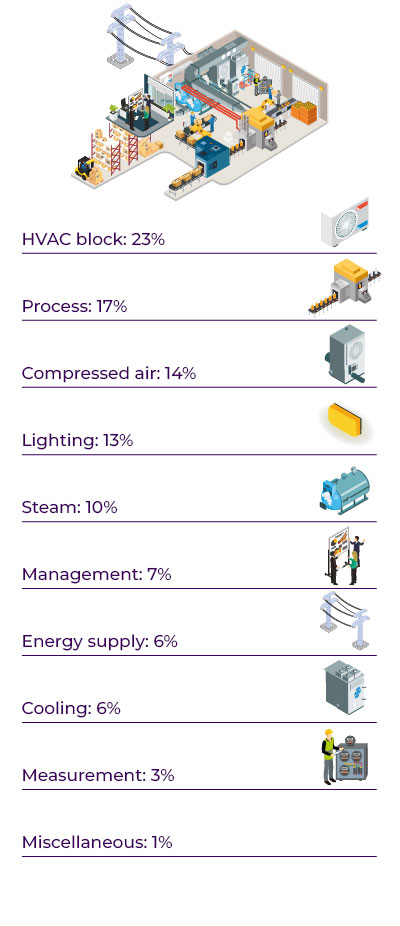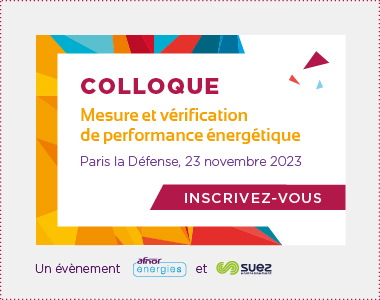Since 2015, large companies have been required to carry out an audit of their energy consumption every four years, together with an action plan to reduce it: this is the regulatory energy audit. Does your company employ more than 250 people and have annual sales of over €50 million or a balance sheet of over €43 million? It must carry out a regulatory energy audit… unless it is ISO 50001 certified. Entrust this mandatory audit to AFNOR Energies: we’ll do it for you, or train you to do it yourself!
Please note: in 2023, the revision of the European directive on energy efficiency has led to the transformation of the tax threshold into a consumption threshold. Companies are therefore required to undergo an energy audit if their consumption exceeds an average of 10 TJ/year over the last three years (i.e. 2.7 GWh). Having deployed an energy management system in line with ISO 50001 recommendations still qualifies for exemption, but from October 2027 will be mandatory for consumption in excess of 85 TJ/year.

An energy audit isn’t free, but it’s worth the effort: by carrying it out, you’ll be able to identify
identify potential energy savings of 20 to 30%,
which, with the right methodology, you can quickly turn into financial savings. AFNOR Energies and its team of qualified auditors have a perfect command of this methodology, thanks to their knowledge of the standards, protocols and best practices governing this exercise (EN 16247, ISO 50002, IPMVP). You can then upload the results to the ADEME platform at .
A status report at T 0
- Item by item
- Energy by energy
- Financial expense
A new awareness
- Waste
- Unsuspected financial gains
Well-identified levers for improvement
- Item by item with reliable sorting
Declaring your intentions
- Objectives and priorities
- Investment
- Project team
Unfolding your action plan
- Monitoring and reporting
- Measurement and verification tools
Consolidate the approach in an EMS
- Continuous improvement
- Global approach
- ISO 50001 certification
What is the relationship between energy audits and energy performance diagnostics (DPE)?
The term “energy audit” is also used for housing, following the reform of the energy performance diagnosis (DPE). Since July 2021, homes classified in category F or G (“energy passoires”) have had to undergo an audit listing possible renovation work. Engineering firms qualified to carry out the “Building” energy audits required of major companies are also qualified for this activity. Finally, the term “energy audit” also covers inspections carried out on renovated homes benefiting from the government’s “Ma Prime Rénov'” scheme.
How does an energy audit work?
Download the study here: https: //telechargement.afnor.info/energies-guide-rex-audits-en-16247
The energy audit must be carried out by a duly qualified internal or external auditor, in accordance with a standardized methodology. In this case, the one described in NF EN 16247, a set of standards covering general requirements, buildings, processes, transport and auditor skills. The standard now defines three levels of audit depth:
- simple audits
- audits for which significant energy use must be measured (and not estimated)
- audits, for which recommendations for action must be based on estimates, not quotations
Encouraging audits based on actual consumption, the revised standard introduces the obligation to define a measurement plan for the purposes of the energy audit, and cites NF EN 17267 of August 2019 as a reference in this respect. This plan will help you verify the effects of the energy-saving actions identified during the audit. This action plan must review all the levers for improving consumption identified in buildings, processes and transport.
Training to become an internal auditor
Companies subject to a statutory energy audit may designate an in-house person to conduct the exercise. But as this exercise has to be carried out in accordance with a standardized methodology, based on NF EN 16247 standards, this person will need to know the reference system inside out. AFNOR Compétences offers several training courses with this objective in mind:
- Transport energy audits, methodology and practical tools
- Building energy audits, methodology and practical tools
- Industrial energy audits, methodology and practical tools
Apply for energy audit qualification
According to a decree of November 24, 2014, an external service provider is recognized as competent to carry out an energy audit if it holds a sign of quality in each of the areas in which it carries out the energy audit (buildings, industrial processes or transport), in compliance with a set of requirements in terms of resources and skills. Make sure your skills are recognized, and don’t miss out on a market of 5,000 large companies for which energy audits have been made compulsory!
AFNOR Certification can help you achieve the required qualification. Administrative and technical criteria, skills, resources, experience: everything is examined to prove your ability to carry out your assignments.
What does ISO 50001 contain? How does it fit in with regulations? All the answers to your questions can be found in our FAQ.
Key points to remember
- Large companies are required to carry out an energy audit every four years.
- The energy audit must be carried out by a duly qualified auditor.




